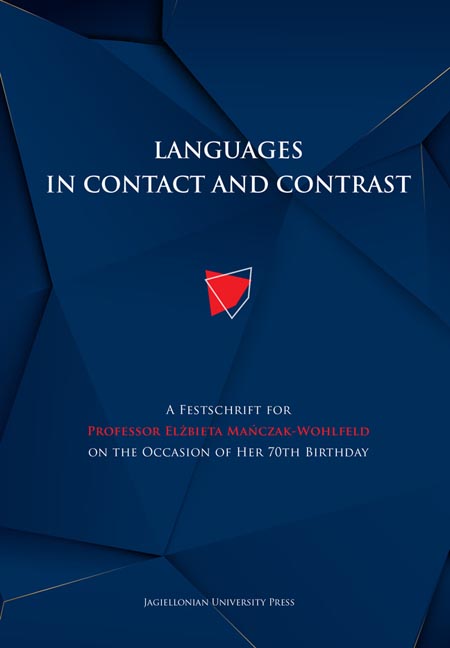 Languages in Contact and Contrast
Languages in Contact and Contrast Published online by Cambridge University Press: 14 October 2023
The only languages that do not change are dead ones.
David Crystal (2007: 357)This book is a collection of papers written in honour of Professor Elżbieta Mańczak-Wohlfeld on the occasion of her 70th birthday. The chapters that follow have been written by linguists affiliated with different universities in Poland and abroad, all of whom wish to pay tribute to Elżbieta’s outstanding work and contribution to language contact scholarship. The papers focus in large measure on contact linguistics, but some of them address also other phenomena.
An eminent linguist and a dedicated academic teacher, Elżbieta has continued to inspire both her students and colleagues, including the editors of this volume. As a committed academic, she has nurtured a generation of linguists, who will surely look back with appreciation and gratitude at the time she spent with them, sharing her expertise and passion for scientific inquiry. As Head of the Chair for English Linguistics at the Institute of English Studies at the Jagiellonian University, Elżbieta has always shown readiness to assist her students and fellow academics with unobtrusive advice. We, her colleagues, are ever mindful that her unfailing support has helped us to pursue our personal and professional endeavors. A paragon of exactitude, Elżbieta is also known for her kindness, friendliness and organisational talents.
Before Elżbieta earned the well-deserved reputation of a distinguished scholar, she graduated in 1973 from the then English Philology Department at the Jagiellonian University and afterwards, in 1977, she completed her doctoral studies in English linguistics at the University of Warsaw (title of her PhD dissertation: “Imperative sentences in English”). Since 1977, Elżbieta has been affiliated with the Jagiellonian University, where she obtained both her post-doctoral degree (1992) and professorship (1996). A year later, in 1997, she was appointed Associate Professor and in 2008 she became a Full Professor.
Elżbieta has authored over 160 publications, including four books: Analiza dekompozycyjna zapożyczeń angielskich w języku polskim (1992), Angielskie elementy leksykalne w języku polskim (1994), Tendencje rozwojowe współczesnych zapożyczeń angielskich w języku polskim (1995) and Angielsko-polskie kontakty językowe (2006).
To save this book to your Kindle, first ensure [email protected] is added to your Approved Personal Document E-mail List under your Personal Document Settings on the Manage Your Content and Devices page of your Amazon account. Then enter the ‘name’ part of your Kindle email address below. Find out more about saving to your Kindle.
Note you can select to save to either the @free.kindle.com or @kindle.com variations. ‘@free.kindle.com’ emails are free but can only be saved to your device when it is connected to wi-fi. ‘@kindle.com’ emails can be delivered even when you are not connected to wi-fi, but note that service fees apply.
Find out more about the Kindle Personal Document Service.
To save content items to your account, please confirm that you agree to abide by our usage policies. If this is the first time you use this feature, you will be asked to authorise Cambridge Core to connect with your account. Find out more about saving content to Dropbox.
To save content items to your account, please confirm that you agree to abide by our usage policies. If this is the first time you use this feature, you will be asked to authorise Cambridge Core to connect with your account. Find out more about saving content to Google Drive.